Crispy, crunchy, slightly chewy and addictive, these baked oyster mushrooms are one of my favorite things to make when I have more oyster mushrooms than I know what to do with. They make a great snack with a cold drink, and I'm surprised there aren't versions bagged in the snack aisle at fancy grocery stores yet.
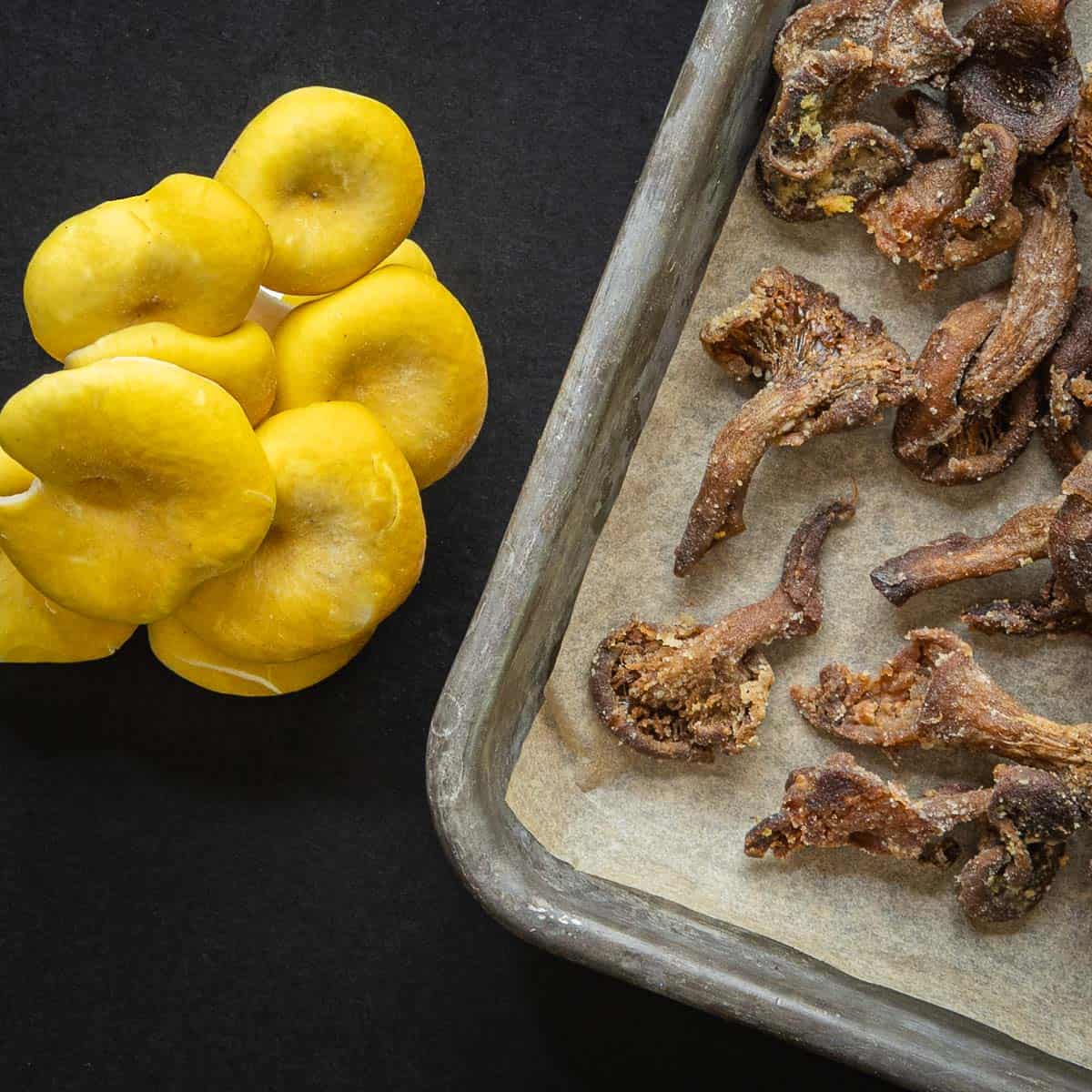
I wrote about these years ago with two different versions that are both good, but typically done with a deep fryer. This baked oyster mushroom recipe is made for mushroom hunters cooking at home. All you need is an oven to make an addictive bar snack or nibble with a cold beer, that'll disappear quickly.
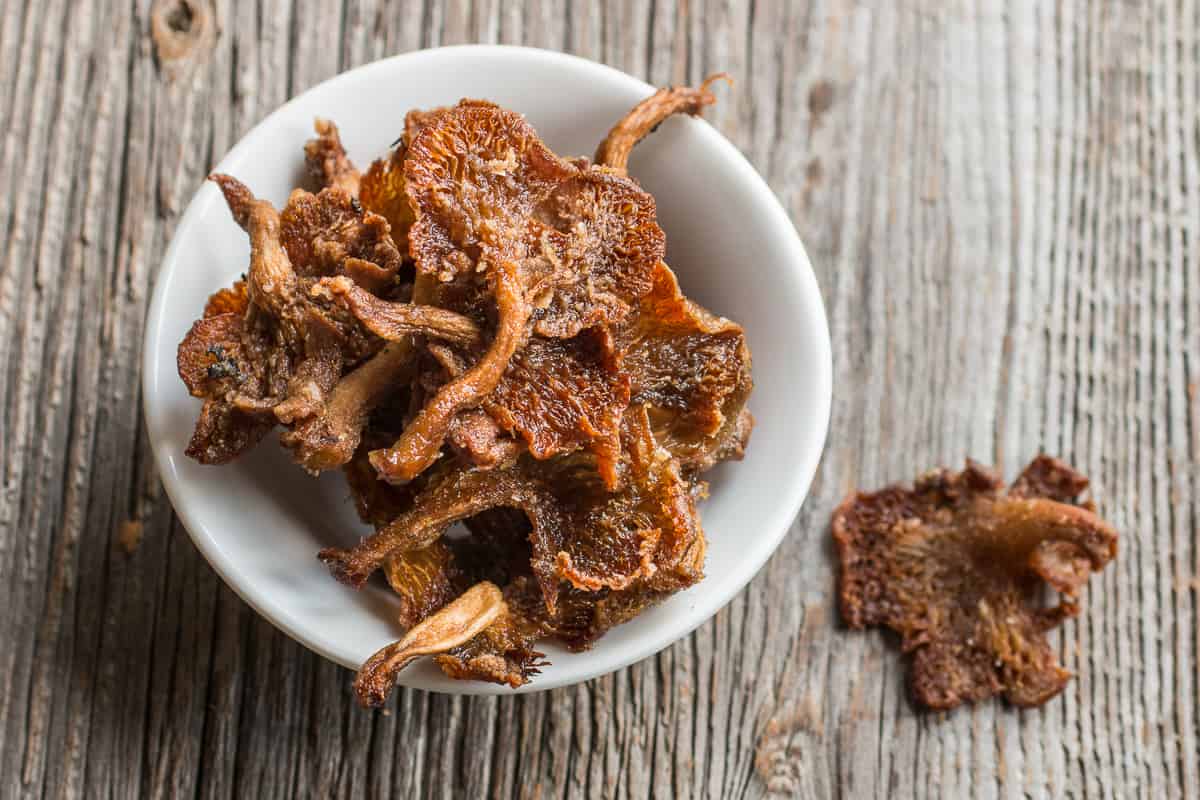
How to Bake Oyster Mushrooms
This is an easy roasted oyster mushroom recipe that anyone can make with only a few ingredients. All you'll need is fresh oyster mushrooms, seasoned flour, salt, oil and a baking sheet.
To make it, first the mushrooms are cleaned and trimmed into pieces. Oyster mushrooms are usually very clean and shouldn't need washing with water if you can avoid it.
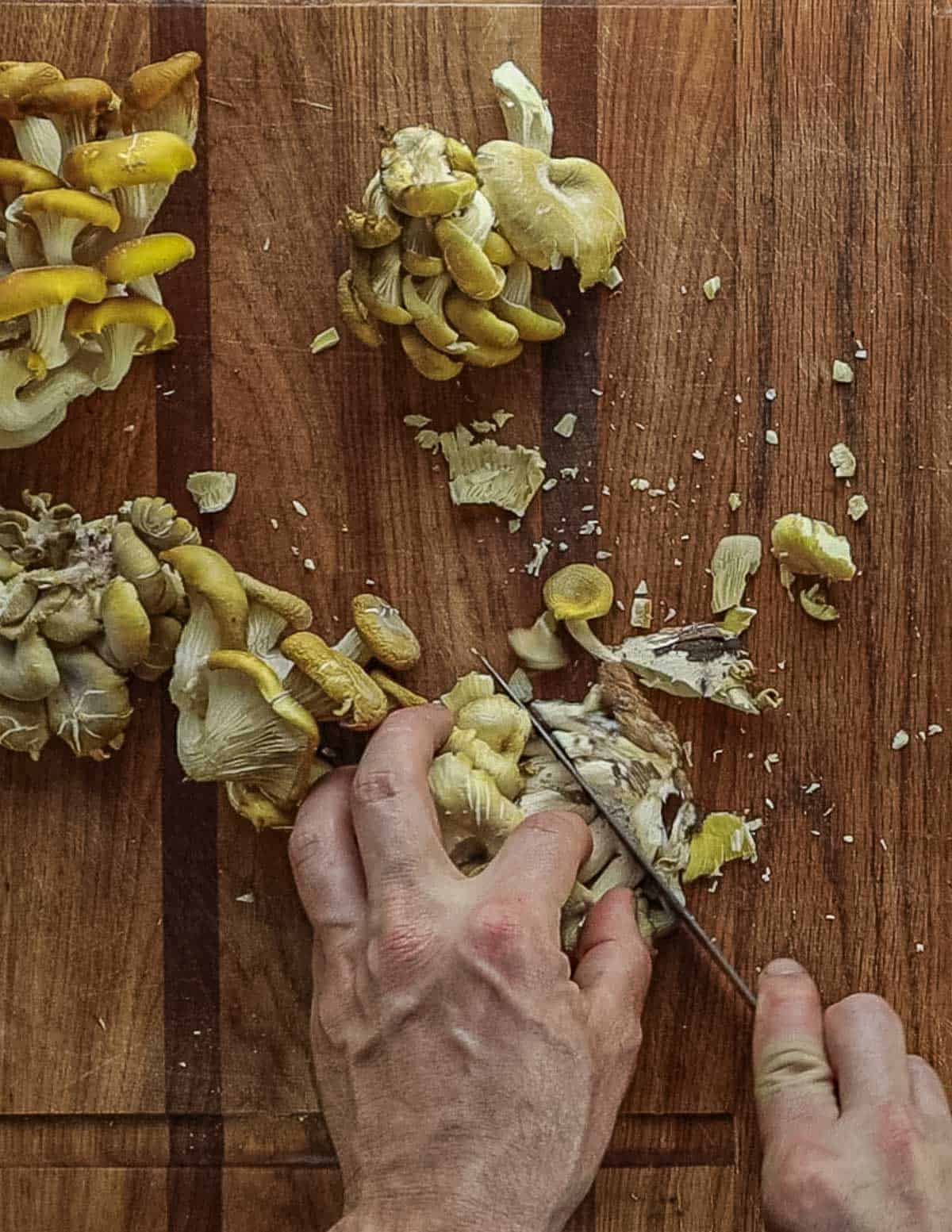
The cleaned mushrooms are gently mixed with oil to coat.
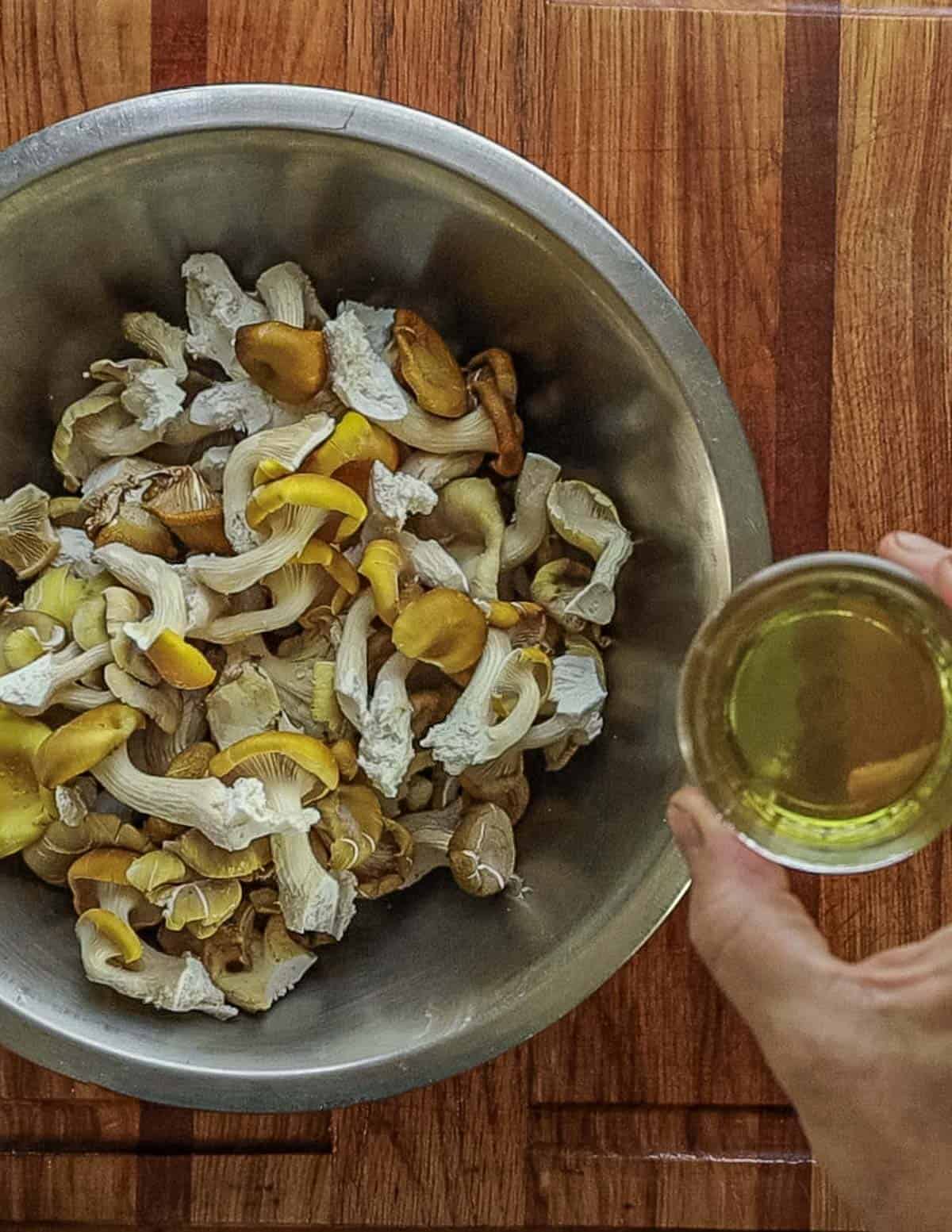
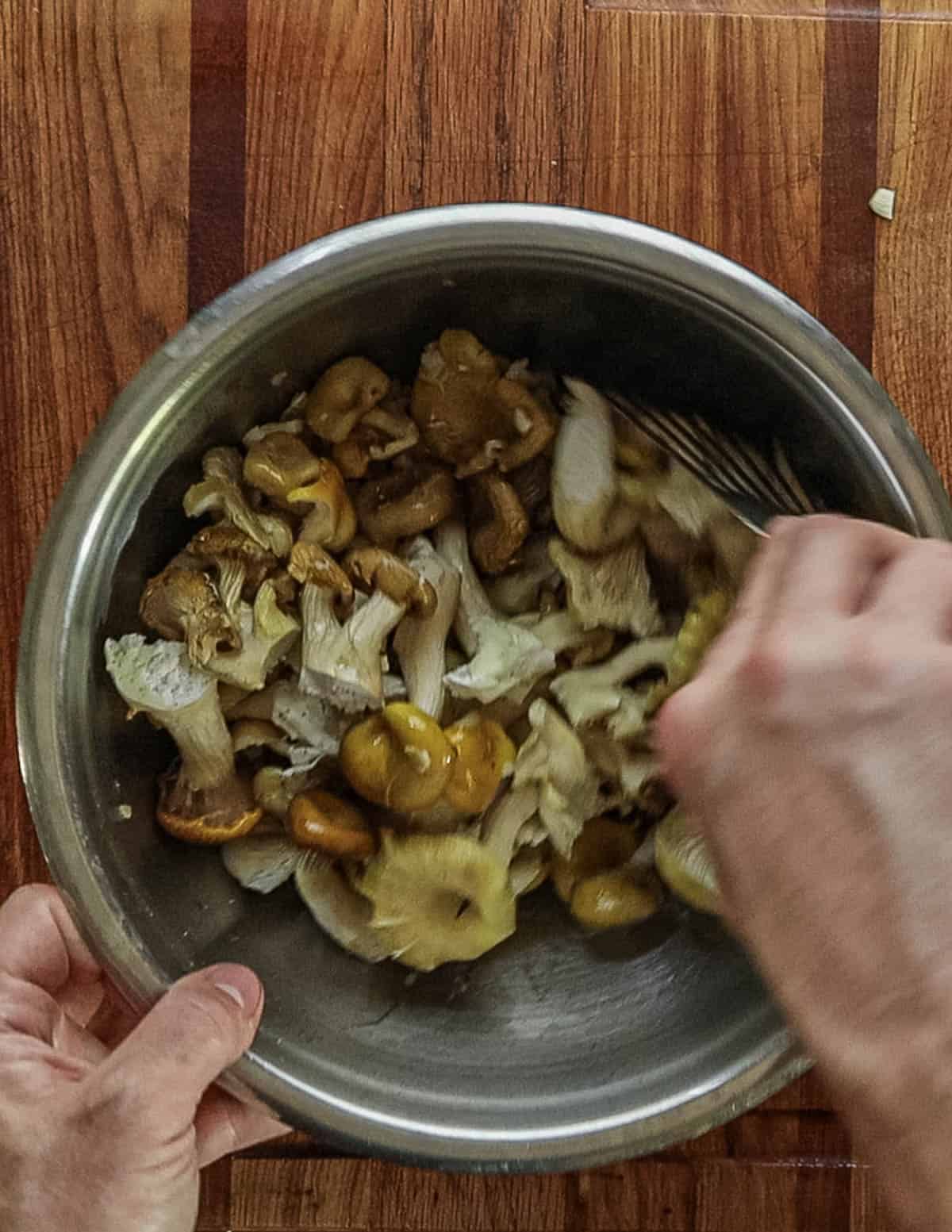
Next, you mix flour, spices and salt. The flour mixture is mixed with the mushrooms
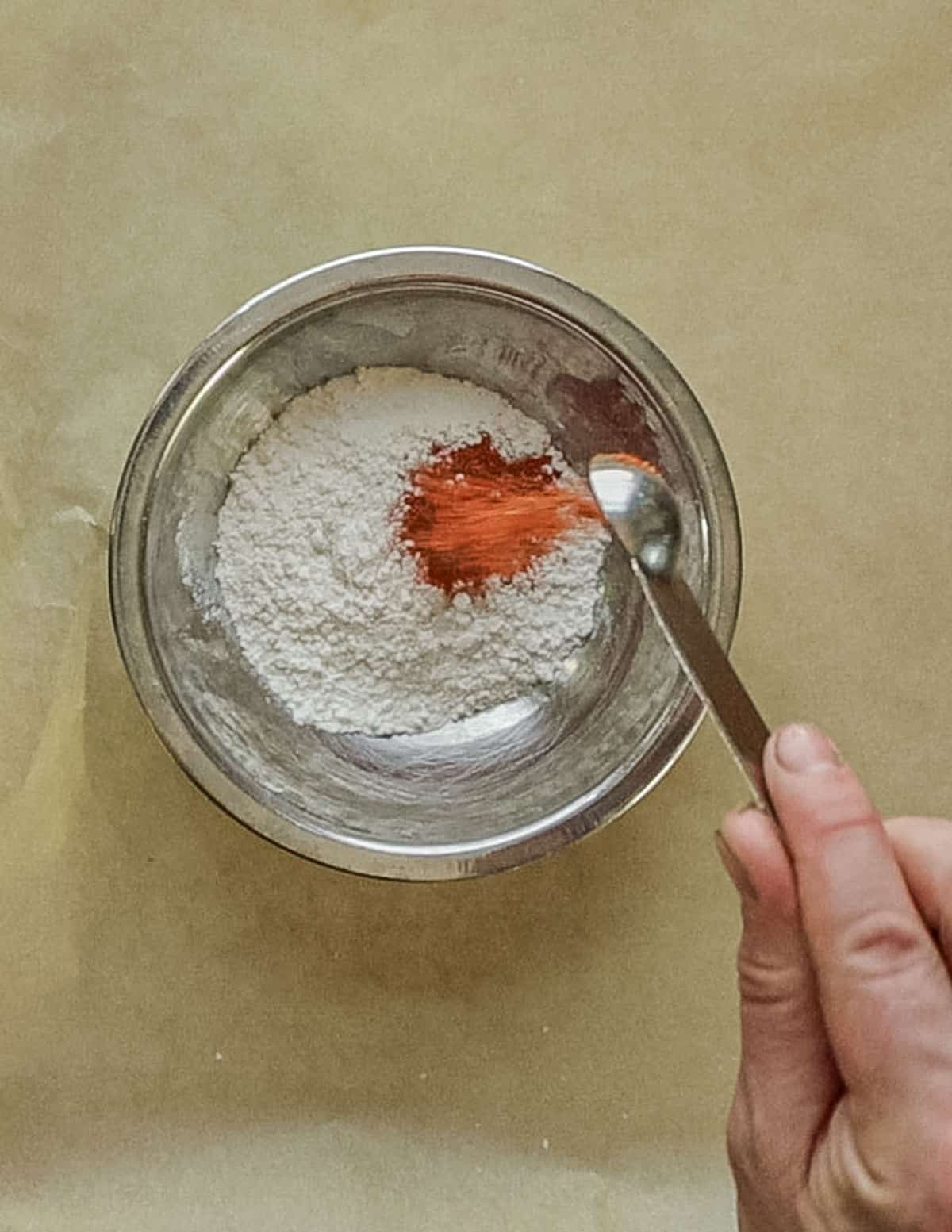
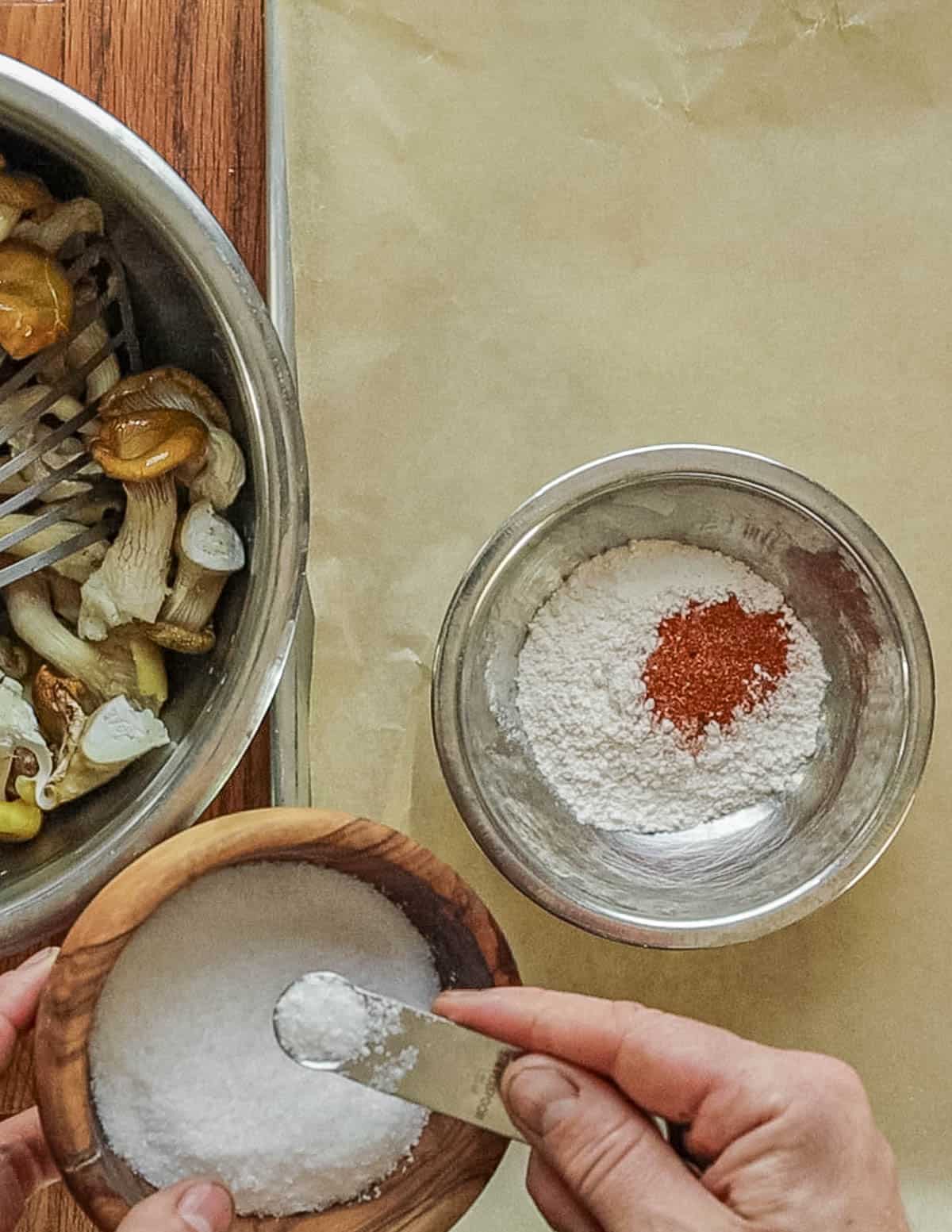
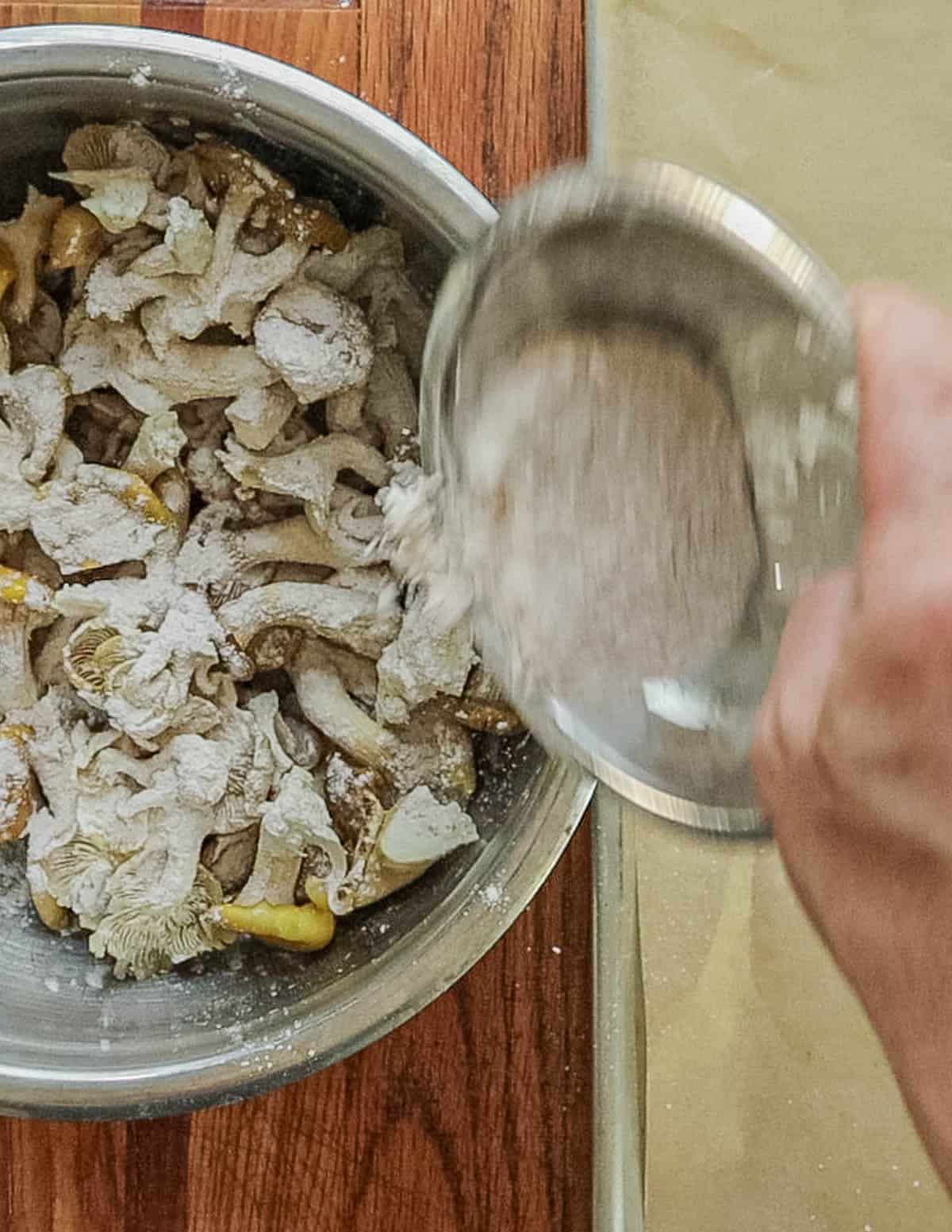
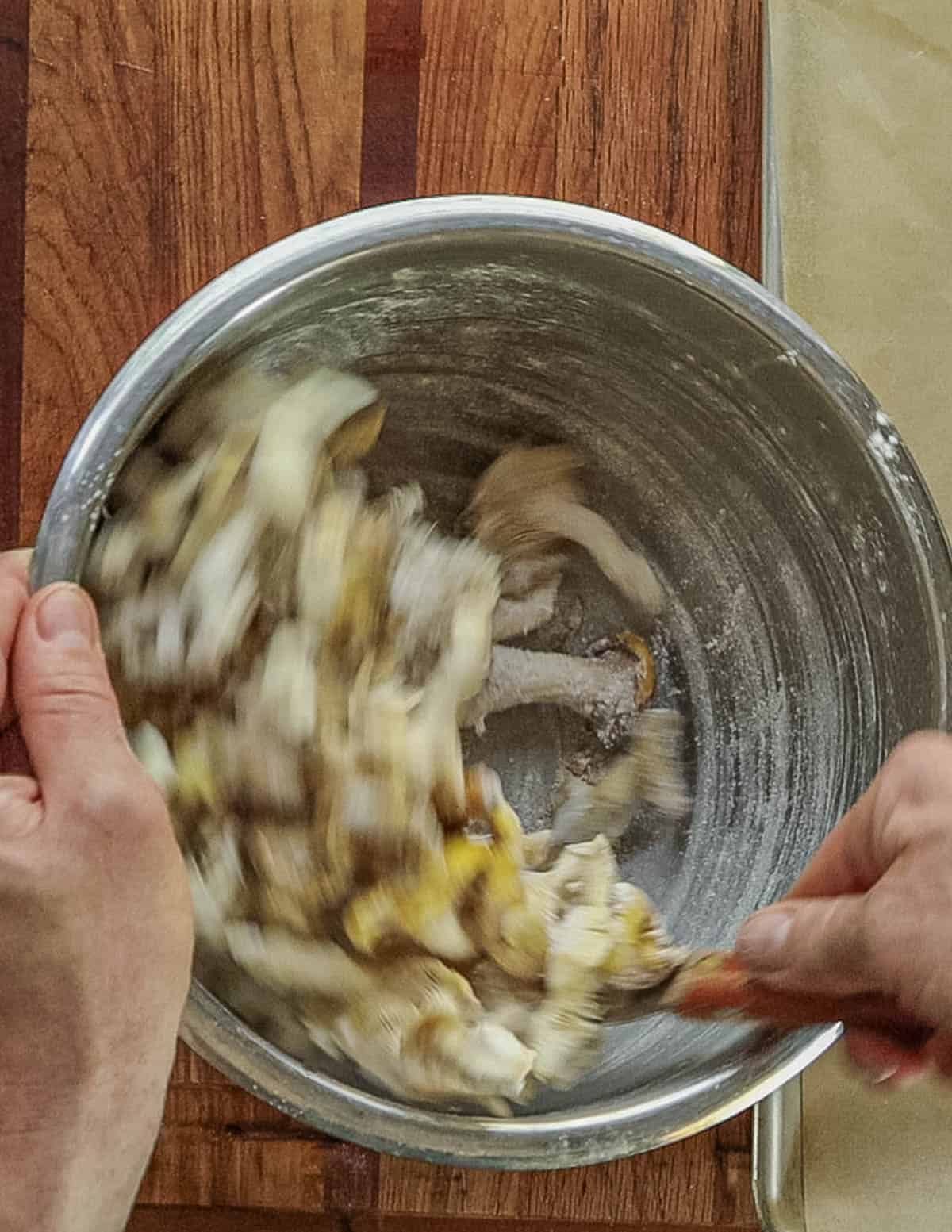
Finally, the mushrooms are spread on a baking sheet in a single layer to encourage even cooking. Bake the mushrooms at 400 F until crisp, turning them over if you see any spots of raw flour.
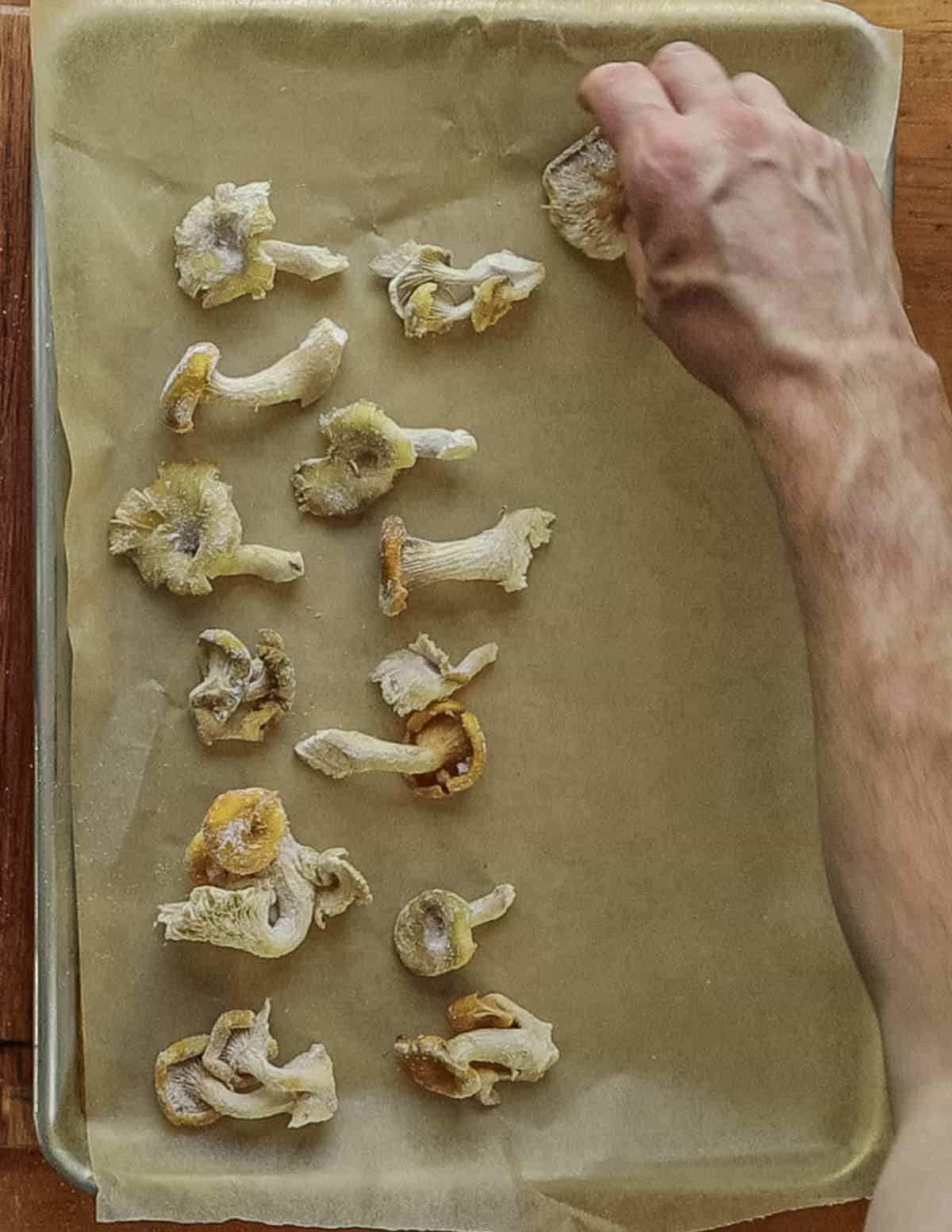
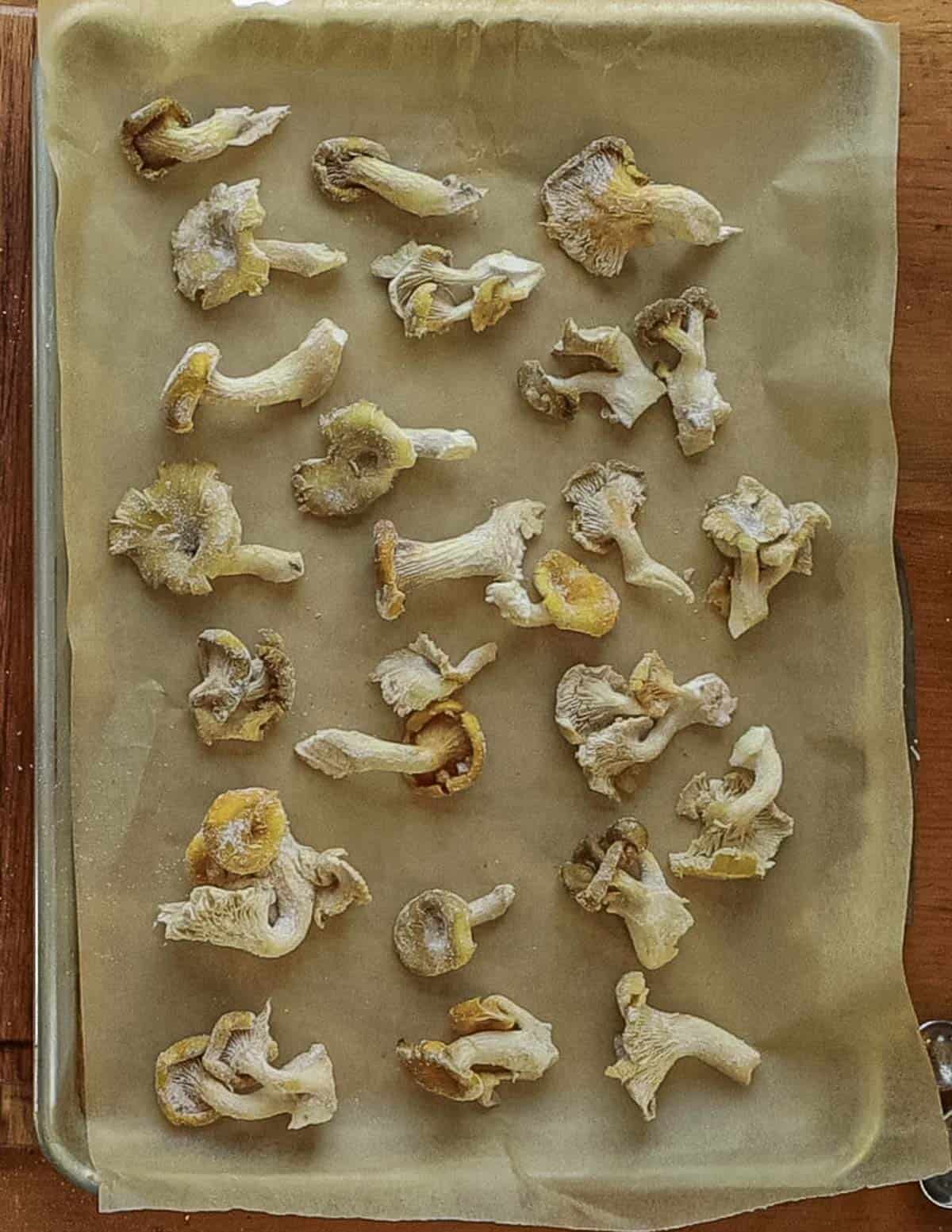
After cooking they can be stored at room temperature for a few days like potato chips. Reheating them gently will bring back the crisp texture.
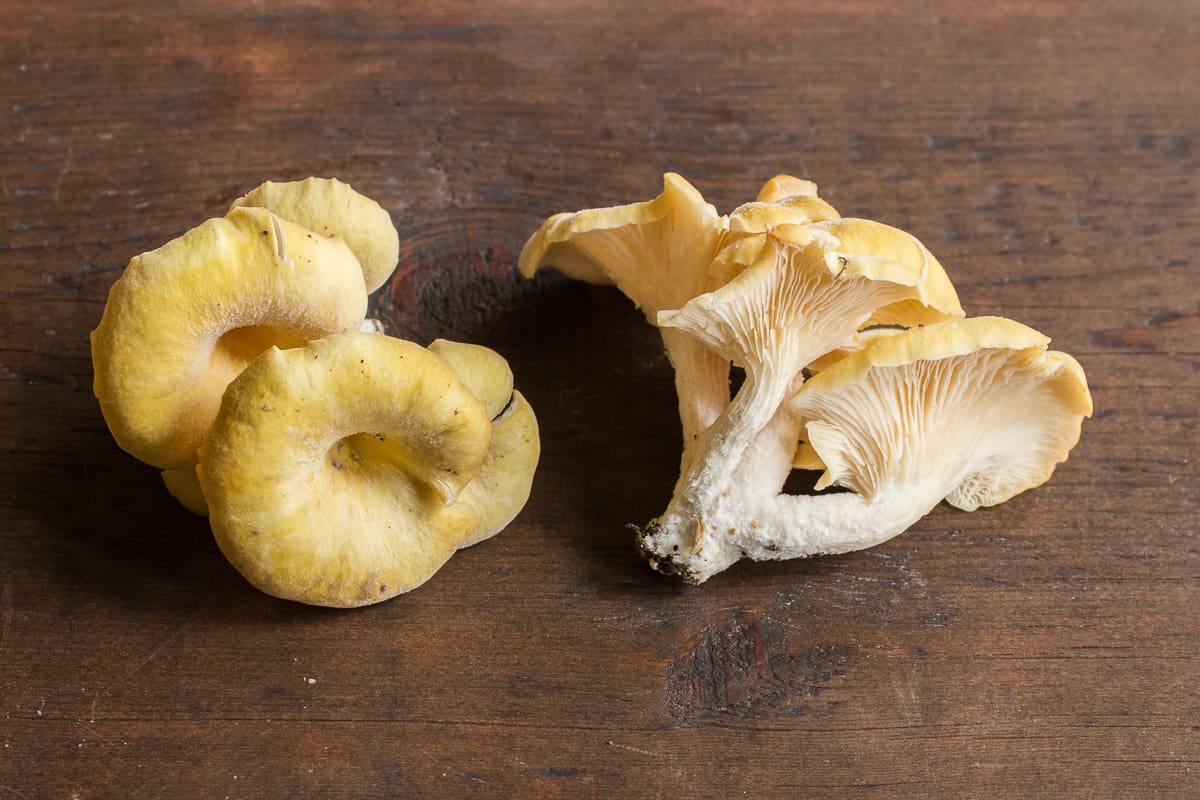
Other mushrooms you can use
Besides oysters, you can do this with a number of other mushrooms. Here's a quick list.
- Crown coral mushrooms (Artomyces pyxidatus)
- Regular oyster mushrooms like Hysizygus ulmarius and all Pleurotii
- Black trumpet mushrooms
- Yellowfoot Chanterelles
Related Posts
Vegetarian and Vegan Mushroom Recipes
Foraging Golden Oyster Mushrooms (Pluerotus citrinopileatus)
Crispy Baked Oyster Mushrooms
Equipment
- 1 baking sheet
- 1 large mixing bowl
- 1 sheet parchment paper
- 1 air fryer optional
Ingredients
- 5 ounces fresh oysters mushrooms
- ⅛ teaspoon kosher or fine salt and pepper
- 3 Tablespoons cooking oil like light olive oil, avocado, etc
- 2 tablespoons all purpose flour or equivalent
- 1 teaspoon spice mixture (optional or to taste) like blackening spice, a homemade spice blend, or a pinch of garlic powder, paprika and onion powder.
Instructions
- Mix the salt and black pepper, flour, and seasoning of your choice (if using). I use blackening spice made without salt.
- Preheat the oven to 400F. Clean the oyster mushrooms. generally they're very clean and may only need to be brushed with a paper towel.
- Separate oyster mushrooms into bite sized pieces or small clusters, then toss with the oil. Most mushrooms I leave whole. Gently toss the mushrooms with the seasoned flour.
- Lay the mushrooms out without overlapping on a baking sheet lined with parchment paper or large cast iron pan.
- Oven roast the mushrooms in a preheated 400F oven for 20-25 minutes. Taste a mushroom, they should golden brown and crispy. If needed, keep them in the oven for another 5 minutes if they're large.
- Remove the mushrooms and allow to cool in the pan, then remove to a container and store at room temperature for up to 2 days.
- The mushrooms can be reheated gently in the oven to re-crisp them, but as long as most of the water has been cooked out and it wasn’t raining when you picked them they should keep a reasonably crisp texture.
Video
Notes
Tips
This can also be made in an air-fryer. Play with the seasonings and make your own blend. I use a teaspoon of homemade blackening spice without salt, but a good pinch of paprika, garlic powder and onion powder is fine too. Chopped fresh herbs like thyme, rosemary and sage work too. Depending on your mushrooms, their moisture content and your oven, you may need to bake them a little more or less, or make a batch or two to tweak the crispness and flavors to your taste.Nutrition
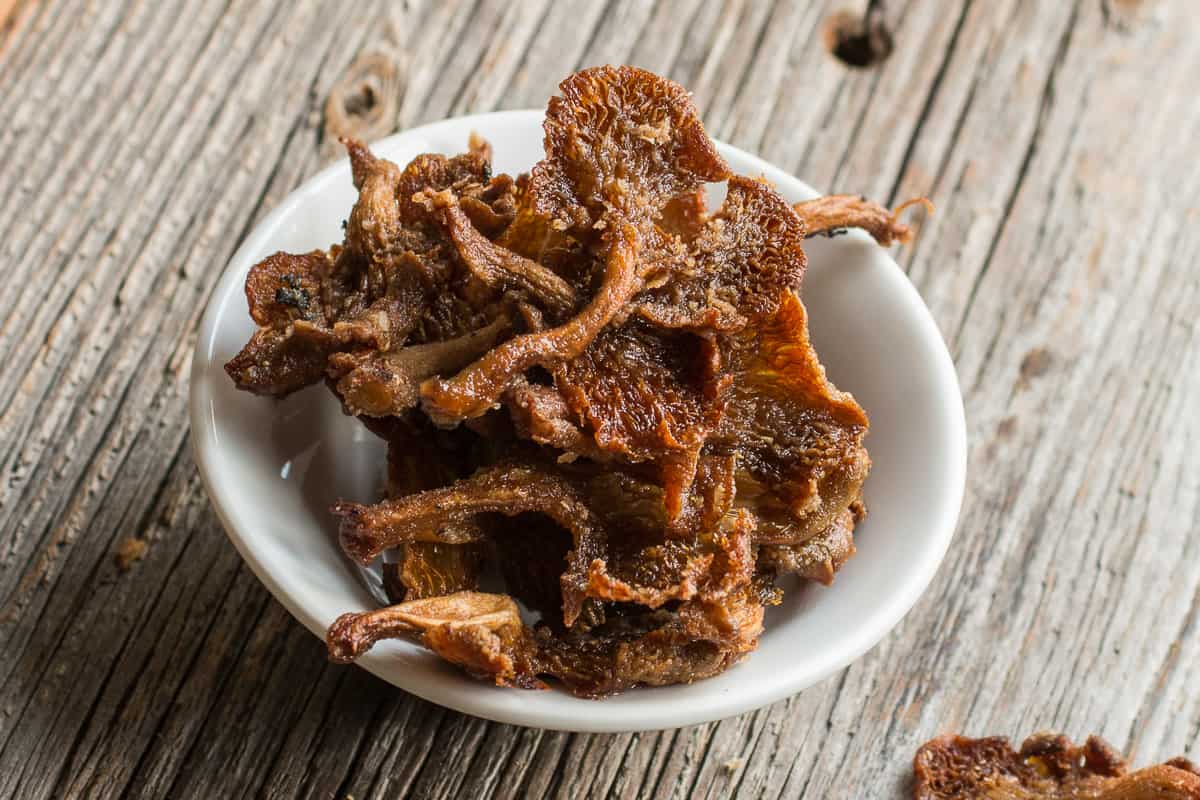

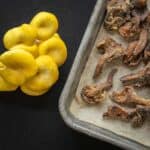
Dave Hedlund
Just made a double batch with Aspen oysters. Very good! Thanks for another great recipe.
Alan Bergo
Thanks Dave. Hope you're having a good season.
Clarice
Making these now, I opted for a Chinese 5 Spice blend as they will be shredded to become vegan duck for Hoisin wraps.
I’m curious to why mushrooms would be stored at room temp?
Alan Bergo
The mushrooms have been cooked and their water evaporated. They’re fine for a few days and will stay crisp. You can refrigerate them too but you’ll need to re-crisp them.
Sarah E MacLean
About to try this with a bounty of goldens I found today in West Michigan. I use a similar recipe without flour for Maitake. Their umami bumps up s notch and they get all savory, buttery and crispy like kale chips.
Alan Bergo
Hey Sarah. Older golden oysters can be a little brittle but young ones work well.
Scott
One of our favorite recipes. These actually freeze and reheat really well. Enjoy during the winter months.
Alan Bergo
Thanks Scott. I'm going to make a note of the freezing here that's helpful.
Sarah E MacLean
This is so great to know. Thank you. I have a bounty and wanted to try something different than dehydrating them. Do you freeze them in double Ziploc or vacuum seal?
lisa
There were SO GOOD I ate them ALL when they were supposedly cooling on the pan! I hike for mushrooms a lot, and now I can't wait to find more oysters. Any tips for mediocre cooks like me for best way to get the oil on them evenly, and same for the flour? I don't have a sprayer for oil (and probably never will).
Deb
I'd like a link to the fried recipe. What a great idea.
lisa
The words "mushroom crouton" in this article IS a link to the recipe of the fried one, it's blue for me on my desktop monitor.
Kathryn Howard
We live in Missour (but I visit Minnesota often and loved Lucias)i, in the St. Louis suburbs, and have a lot of these in the woods around our house. I never really knew what to do with them but now have an idea. BTW, we picked up some Ida Graves Amaro, and plan to try it over the holidays. Good luck on your new ventures, and I count you as a fan. You should compare notes with Rob Connoley of Bulrush; he is working on heirloom Ozark plantings for his restaurant, and partnering with Scratch, a foraged microbrewery in southern Illinois which is awesome.
Alan Bergo
I know Rob in passing and have enjoyed his book. Thanks for supporting the Amaro—we have a nocino in stores now too. The oyster croutons are one of my favorite things to make with them too. A
Keith
I can't wait to try this technique with the mushrooms that I reliably find in abundance- honey, chanterelles and hen of the woods. Also really liked your show and look forward to more episodes. Nothing makes me feel closer or more a part of nature than foraging. I think YouTube channels like Primitive Technology get millions of views because there is no music or voices- only the sounds of the environment. I'd love to see you do the same thing with just the foraging section of the video. It would be great if you could capture that feeling- of changing from someone walking through an environment to someone that is now part of the environment. Also for the cooking section, you could do both a simple recipe and a "next level version"- a recipe for someone just starting to cook wild ingredients and something for those of use wanting to experience new ingredients, recipes antechniques. But whatever twists/turns the show takes, count me as a fan.
Julian A Milillo
I'm starting a small mushroom growing business and I was hoping to write you but have had a hard time finding a way to contact you. I apologize for doing it through here but I've been looking for over an hour. I hope it's ok.
I did want to ask as well. This looks a lot like a mushroom I tried in Laos. They were flavored with lime and spicy peppers and were very crispy. Were they an inspiration for preparing it like this? It's a great idea to cook them this way especially because they'll keep for a bit longer I'd think. I'm always looking to extend my mushrooms edible life span. I will definitely have to try this and see how well they keep.
lisa
Last paragraph of the "About" page.